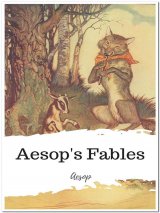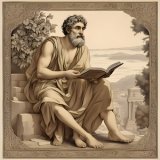Aesop's Fables Page #19
Aesop's Fables, or the Aesopica, is a collection of fables credited to Aesop, a slave and storyteller believed to have lived in ancient Greece between 620 and 564 BCE.
THE LABOURER AND THE SNAKE A Labourer's little son was bitten by a Snake and died of the wound. The father was beside himself with grief, and in his anger against the Snake he caught up an axe and went and stood close to the Snake's hole, and watched for a chance of killing it. Presently the Snake came out, and the man aimed a blow at it, but only succeeded in cutting off the tip of its tail before it wriggled in again. He then tried to get it to come out a second time, pretending that he wished to make up the quarrel. But the Snake said, "I can never be your friend because of my lost tail, nor you mine because of your lost child." Injuries are never forgotten in the presence of those who caused them. THE CAGE-BIRD AND THE BAT A Singing-bird was confined in a cage which hung outside a window, and had a way of singing at night when all other birds were asleep. One night a Bat came and clung to the bars of the cage, and asked the Bird why she was silent by day and sang only at night. "I have a very good reason for doing so," said the Bird: "it was once when I was singing in the daytime that a fowler was attracted by my voice, and set his nets for me and caught me. Since then I have never sung except by night." But the Bat replied, "It is no use your doing that now when you are a prisoner: if only you had done so before you were caught, you might still have been free." Precautions are useless after the event. THE ASS AND HIS PURCHASER A Man who wanted to buy an Ass went to market, and, coming across a likely-looking beast, arranged with the owner that he should be allowed to take him home on trial to see what he was like. When he reached home, he put him into his stable along with the other asses. The newcomer took a look round, and immediately went and chose a place next to the laziest and greediest beast in the stable. When the master saw this he put a halter on him at once, and led him off and handed him over to his owner again. The latter was a good deal surprised to see him back so soon, and said, "Why, do you mean to say you have tested him already?" "I don't want to put him through any more tests," replied the other: "I could see what sort of beast he is from the companion he chose for himself." A man is known by the company he keeps. THE KID AND THE WOLF A Kid strayed from the flock and was chased by a Wolf. When he saw he must be caught he turned round and said to the Wolf, "I know, sir, that I can't escape being eaten by you: and so, as my life is bound to be short, I pray you let it be as merry as may be. Will you not play me a tune to dance to before I die?" The Wolf saw no objection to having some music before his dinner: so he took out his pipe and began to play, while the Kid danced before him. Before many minutes were passed the gods who guarded the flock heard the sound and came up to see what was going on. They no sooner clapped eyes on the Wolf than they gave chase and drove him away. As he ran off, he turned and said to the Kid, "It's what I thoroughly deserve: my trade is the butcher's, and I had no business to turn piper to please you." THE DEBTOR AND HIS SOW A Man of Athens fell into debt and was pressed for the money by his creditor; but he had no means of paying at the time, so he begged for delay. But the creditor refused and said he must pay at once. Then the Debtor fetched a Sow--the only one he had--and took her to market to offer her for sale. It happened that his creditor was there too. Presently a buyer came along and asked if the Sow produced good litters. "Yes," said the Debtor, "very fine ones; and the remarkable thing is that she produces females at the Mysteries and males at the Panathenea." (Festivals these were: and the Athenians always sacrifice a sow at one, and a boar at the other; while at the Dionysia they sacrifice a kid.) At that the creditor, who was standing by, put in, "Don't be surprised, sir; why, still better, at the Dionysia this Sow has kids!" THE BALD HUNTSMAN A Man who had lost all his hair took to wearing a wig, and one day he went out hunting. It was blowing rather hard at the time, and he hadn't gone far before a gust of wind caught his hat and carried it off, and his wig too, much to the amusement of the hunt. But he quite entered into the joke, and said, "Ah, well! the hair that wig is made of didn't stick to the head on which it grew; so it's no wonder it won't stick to mine." THE HERDSMAN AND THE LOST BULL A Herdsman was tending his cattle when he missed a young Bull, one of the finest of the herd. He went at once to look for him, but, meeting with no success in his search, he made a vow that, if he should discover the thief, he would sacrifice a calf to Jupiter. Continuing his search, he entered a thicket, where he presently espied a lion devouring the lost Bull. Terrified with fear, he raised his hands to heaven and cried, "Great Jupiter, I vowed I would sacrifice a calf to thee if I should discover the thief: but now a full-grown Bull I promise thee if only I myself escape unhurt from his clutches." THE MULE One morning a Mule, who had too much to eat and too little to do, began to think himself a very fine fellow indeed, and frisked about saying, "My father was undoubtedly a high-spirited horse and I take after him entirely." But very soon afterwards he was put into the harness and compelled to go a very long way with a heavy load behind him. At the end of the day, exhausted by his unusual exertions, he said dejectedly to himself, "I must have been mistaken about my father; he can only have been an ass after all." THE HOUND AND THE FOX A Hound, roaming in the forest, spied a lion, and being well used to lesser game, gave chase, thinking he would make a fine quarry. Presently the lion perceived that he was being pursued; so, stopping short, he rounded on his pursuer and gave a loud roar. The Hound immediately turned tail and fled. A Fox, seeing him running away, jeered at him and said, "Ho! ho! There goes the coward who chased a lion and ran away the moment he roared!" THE FATHER AND HIS DAUGHTERS A Man had two Daughters, one of whom he gave in marriage to a gardener, and the other to a potter. After a time he thought he would go and see how they were getting on; and first he went to the gardener's wife. He asked her how she was, and how things were going with herself and her husband. She replied that on the whole they were doing very well: "But," she continued, "I do wish we could have some good heavy rain: the garden wants it badly." Then he went on to the potter's wife and made the same inquiries of her. She replied that she and her husband had nothing to complain of: "But," she went on, "I do wish we could have some nice dry weather, to dry the pottery." Her Father looked at her with a humorous expression on his face. "You want dry weather," he said, "and your sister wants rain. I was going to ask in my prayers that your wishes should be granted; but now it strikes me I had better not refer to the subject."
Translation
Translate and read this book in other languages:
Select another language:
- - Select -
- 简体中文 (Chinese - Simplified)
- 繁體中文 (Chinese - Traditional)
- Español (Spanish)
- Esperanto (Esperanto)
- 日本語 (Japanese)
- Português (Portuguese)
- Deutsch (German)
- العربية (Arabic)
- Français (French)
- Русский (Russian)
- ಕನ್ನಡ (Kannada)
- 한국어 (Korean)
- עברית (Hebrew)
- Gaeilge (Irish)
- Українська (Ukrainian)
- اردو (Urdu)
- Magyar (Hungarian)
- मानक हिन्दी (Hindi)
- Indonesia (Indonesian)
- Italiano (Italian)
- தமிழ் (Tamil)
- Türkçe (Turkish)
- తెలుగు (Telugu)
- ภาษาไทย (Thai)
- Tiếng Việt (Vietnamese)
- Čeština (Czech)
- Polski (Polish)
- Bahasa Indonesia (Indonesian)
- Românește (Romanian)
- Nederlands (Dutch)
- Ελληνικά (Greek)
- Latinum (Latin)
- Svenska (Swedish)
- Dansk (Danish)
- Suomi (Finnish)
- فارسی (Persian)
- ייִדיש (Yiddish)
- հայերեն (Armenian)
- Norsk (Norwegian)
- English (English)
Citation
Use the citation below to add this book to your bibliography:
Style:MLAChicagoAPA
"Aesop's Fables Books." Literature.com. STANDS4 LLC, 2025. Web. 11 Jan. 2025. <https://www.literature.com/book/aesop%27s_fables_316>.




Discuss this Aesop's Fables book with the community:
Report Comment
We're doing our best to make sure our content is useful, accurate and safe.
If by any chance you spot an inappropriate comment while navigating through our website please use this form to let us know, and we'll take care of it shortly.
Attachment
You need to be logged in to favorite.
Log In